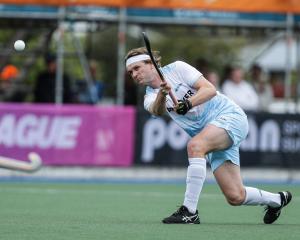At least that's what former Otago hockey representative Arthur Parkin has discovered.
But then it has been 40 years since he helped the New Zealand men's team to pull off a stunning feat to win gold at the Montreal Olympics in 1976.
Journalist Suzanne McFadden has retold the team's story in a new book called Striking Gold.
The Otago Daily Times caught up with the left wing and found Parkin's memories where both vivid and sketchy.
He recalls only too well slogging up Dunedin's hills in the early hours during the middle of winter.
That kind of pain sears an indelible mark on your psyche.
But Parkin was so determined to be at peak fitness he would put his running shoes back on later in the day and pound his way around Logan Park.
"During the build-up for the Olympics we went on a Lydiard-type mileage programme,'' Parkin said.
"It felt like I was doing nothing else except running.''
Most weeks he was running "between 60 to 70 miles'' - that's 96 to 112km.
The rest of the team, although scattered throughout the country, was doing the same and fitness proved to be a key plank in their success.
During the 1-0 win over Australia in the Olympic final, Parkin remembers one particular moment with clarity.
He had dribbled the ball out of defence and all the way upfield, where he whacked in a centre pass.
"At the end of that I thought I was pretty much gone physically. I looked up on the clock and there was still 13 minutes to go.''
He found the reserves to keep moving, to keep battling for possession and to keep believing.
And so did the team.
New Zealand held on to create a special part of the country's sporting history.
Parkin admitted most of the game, though, was a "bit of a blur, to be honest''.
"The whole process of this book, and the one thing we all agree on, is that pretty much our memory of what you think is fact does not always turn out to be quite right.
"What do I remember about it? I remember the trip from the village to the ground.
"That time was usually filled with song and singing and joking and laughing. But for the final you could have heard a pin drop the whole way. There was absolute silence.
"We had an opportunity and we weren't going to let it slip. That bus trip was memorable because of its silence.''
Australia dominated the opening half and should have led by perhaps a couple of goals, he said.
"I remember the halftime team talk that Ross Gillespie gave. He got stuck into us.
"We went out and dominated for the next 20 minutes. I missed two goals, we scored our corner; we'd already missed a stroke and put it over the top.''
It is doubtful there has been a successful sporting team anywhere in the world which has not been described as being fiercely determined.
But in New Zealand's case, the team actually has documented proof.
Parkin studied physical education while in Dunedin and during that year he did some research into the personalities of hockey players.
Using a standard personality test for the time, he tested club, provincial and international players.
The results suggested that collectively the New Zealand players were more determined, self-reliant and independent than players at the other levels.
His research was published in an exercise physiology journal.
"Those guys were very determined and collectively, that team was just incredibly determined to fight.''










